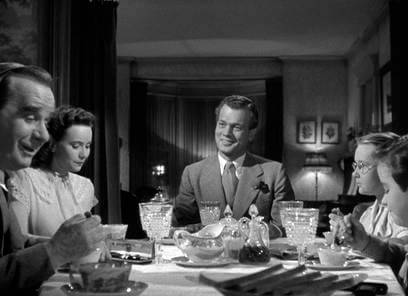

Uncle Charlie turns and looks directly down the camera lens: "Are they?" "But they're alive, they're human beings," she replies. Seen from young Charlie's point of view, the camera slowly creeps in on his face as he describes them as "horrible, fat, fading women". The film's best scene takes place around the dinner table where Uncle Charlie tells the family what he thinks about women, specifically rich widows. Hitchcock keeps proceedings deliberately ambiguous, spoon-feeding us clues: a missing newspaper clipping here, a recurring hummed tune there …

Young Charlie's idolisation of her uncle slowly turns to suspicion as she gets the feeling that there might be a secret behind his smile.

Life is pretty quiet but excitement arrives when successful, enigmatic relative Uncle Charlie (Joseph Cotten) comes to stay. The type of place where people leave their front doors unlocked and everyone knows everyone. Young Charlie (played by Teresa Wright) lives with her "average American family" in the small town of Santa Rosa. Yet it could be argued that it had been hiding there all along, behind closed doors, since Shadow of a Doubt in 1943.


 0 kommentar(er)
0 kommentar(er)
